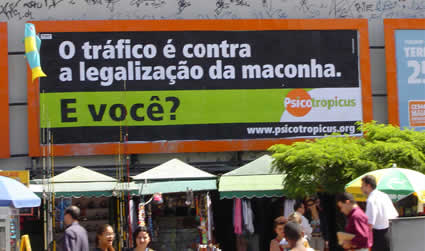Feature:
Western
Hemisphere
Anti-Prohibitionists
Set
to
Gather
in
Buenos
Aires
8/26/05
Argentina's capital city will be the location of a three-day conference early next month bringing together anti-prohibitionists from across the hemisphere in an effort to strengthen a nascent movement to end the war on drugs. At the same time, conference organizers are bringing a handful of Latin America legislators to Buenos Aires and working with Argentine legislators to win interim battles between now and the end of drug prohibition. The Latin American Anti-Prohibitionist Meeting for Drug Policy Reform and the First Regional Symposium of Judges and Legislators on Drug Policy will take place in the Argentine government's Senate chambers in Buenos Aires on September 7, 8, and 9, and organizers expect delegations from across Latin America to attend, as well as fellow anti-prohibitionists from the US and Europe. DRCNet will be there, with Drug War Chronicle editor Phil Smith scheduled to address the conference, as will the International Anti-Prohibitionist League and the European Coalition for a More Just and Effective Drug Policy.
Legislators coming to the conference include Colombian representative Pedro Arena, Bolivian legislator Dionisio Nunez, and Uruguay's Margarita Percovitch. At the conference, they will be joined by at least two members of the Argentine congress who have been supportive of drug policy reform, Senator Diana Conti and Deputy Eduardo Garcia. An outgrowth of earlier continental meetings on drug reform, such as the 2003 Out from the Shadows conference in Merida, Mexico, organized in part by DRCNet, and the Global Social Forum conference on drug policy last year in Cartagena, Colombia, the Buenos Aires conference will take on three tasks, said lead organizer Dr. Silvia Inchaurraga of ARDA. "First, there will be meetings of REFORMA, the Latin American anti-prohibitionist network," she told DRCNet. "We are a new and very spirited grouping and we need to establish our network and set priorities with an eye toward the battle over the UN conventions in Vienna in 2008," she said. REFORMA is designed as both a broad harm reduction network and an anti-prohibitionist network founded on human rights and social justice. Its coordinating committee consists of honorary president Gustavo de Greiff, former attorney general of Colombia, Maria Mercedes Moreno of Mama Coca, ARDA's Inchaurraga, Luiz Paulo Guanabara of Psicotropicus, Peruvian coca-grower advisor Baldomero Caceres, Jamaica NORML's Paul Chang, and Agustin Lapetina of El Abrojo. "There will also be an open meeting where we can involve key actors from across Latin America to hear from others about the possibilities for change," Inchaurraga said. "The issues vary from country to country. In Jamaica, it's a movement for legal marijuana, in the Andean countries, it's about the legalization of coca leaf, in the consumer countries like Argentina, Brazil, and Uruguay, it's about decriminalization and depenalization. But all of us are victims of prohibitionist thinking and policies, and we think we can all learn things from each other," she explained. "This is especially important in those countries where drug users are not organized," she added. "Last but not least, we have the symposium with the legislators," Inchaurraga continued. "Legislators are key actors who can help develop new laws and new policies. We want to show them they are not alone, and we want to give them the chance to get to know and support one another to strengthen a continental reformist bloc." It won't be just legislators, but judges and government officials as well, including Argentine federal court judge Eduardo Freiler and Uruguayan drug minister Milton Romani. For Inchaurraga and the Argentines, the legislative sessions at the meeting will hopefully have a more direct impact. "We have two depenalization bills pending, one authored by Sen. Conti, the other by Deputy Garcia, but neither is moving. They are dormant in the legislature, but we think this kind of event and the attention we hope it will generate will help push forward drug law reform here in Argentina." The conference will concentrate on a number of themes common across the continent: Drug policy reform in the face of the failed war on drugs, the global and regional impact of drug prohibition, comparative legislative and criminal justice approaches, a critical approach to the UN drug conventions, harm reduction and its role in drug policy reform, peasant and social movements confronting prohibition, and legal and judicial aspects of decriminalization and legalization. In Buenos Aires next month, the hemispheric movement for an end to drug prohibition finally gets under way.
|

